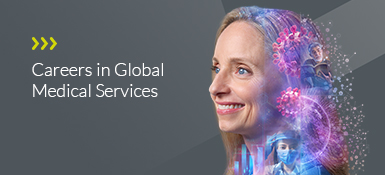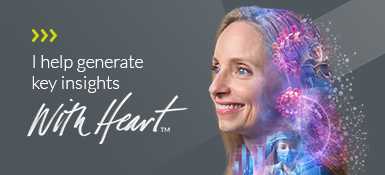Insights from Diana Hengartner, Senior Medical Director at Parexel

At the heart of Parexel is the world's most remarkable insight-generation engine: our people.
Meet Diana Hengartner, a Senior Medical Director whose hands-on experience treating Parkinson's patients shapes her approach to clinical research. Her practical insights help teams design better trials and overcome real-world challenges. Diana bridges medical expertise with new technologies to advance Parkinson's treatment, while still finding time for her family and beloved piano—bringing both scientific rigor and human understanding to everything she does.
I am Diana Hengartner. I am a Senior Medical Director in the Neuroscience team at Parexel. I am a neurologist with fellowship training in Parkinson's disease and Movement disorders.
Before Parexel, I worked as a movement disorder specialist in the academic setting, diagnosing and treating patients with Parkinson’s disease, tremor, dystonias, MSA, PSP, Lewy Body Disease, HD, Atypical Parkinsonism, Ataxia, Myoclonic disorders. In the academic setting (Cleveland Clinic Foundation and Northwestern Medicine), I served as principal investigator, sub-investigator, protocol creator and advisor for investigator-initiated pharmaceutical research studies. While taking care of Parkinson's disease patients, you encounter the hard reality that despite all your efforts and all the available treatments to help ameliorate the symptoms, the disease continues to progress, causing significant suffering and disability. Witnessing this reality compelled me to support research for disease-modifying therapies, which fueled my passion for clinical research in PD. I believe that if we don't act now by applying our collective knowledge and training to design better clinical trials, progress toward effective disease-modifying treatments will remain stagnant.
At Parexel, I am the medical lead on multiple clinical trials, guiding study teams in the therapeutic indication of the trial. My updated knowledge of the trends and treatment options allows me to guide my teams effectively. I help biopharmaceutical companies find solutions and mitigations to potential study risks and pitfalls; by doing this, we can help make studies successful. Patients who participate in clinical trials directly benefit from studies that are meticulously organized and successfully implemented
Why do you enjoy working at Parexel?
Parexel has enabled me to successfully transition from being an academic neurologist into an effective clinical trial leader working on Parkinson disease trials. I have been able to grow in my career, protect my goals and my professional niche, and focus on the area of my interest. And by doing so, I have grown tremendously as a professional in my knowledge of Parkinson disease drug development.
If you had to describe the culture of Parexel in one word, what would it be and why?
Parexel's culture is "enabling." Parexel exposes you to different types of studies across indications and therapeutic strategies. It's an environment that allows professional growth and achievement of goals in your specific area of interest.
What inspires you to do what you do?
- The ability to impact many patients and families by making clinical trials successful.
- To contribute my knowledge to finding therapeutic options for neurodegenerative diseases, specifically Parkinson's disease, where we have the great need to find therapeutic options to slow or halt disease progression.
- Research is my passion. I discovered this early in my training, and it was nurtured by my mentors during my academic career. I truly believe I'm doing what I love.
Bridging Patient Care and Research
As a Medical Director, how does the use of insights fuel the advancement of clinical research?
When you are a medical lead on a clinical trial, you guide your team in the therapeutic indication of the trial. You have the invaluable knowledge of having treated patients within your specialty. You have firsthand knowledge of the daily patient's needs and struggles. With that knowledge, you can advise your functional team-operational, data management, pharmacology, scientific, risk management, startup, feasibility, regulatory, etc.—on what to do and what not to do. All of that brings the team together and makes the study successful.
What does that hands-on experience with patients mean to biopharmaceutical companies?
It's incredibly important. Sometimes a protocol looks good on paper, but when the study setup starts, you realize it might not be as feasible as originally written. Patients might not tolerate long assessments, frequent visits, or multiple and frequent invasive procedures like lumbar taps. Patients might not be willing to be on the placebo arm if they are not offered the study drug later on. Patients and their families have their own needs and limitations, especially in my field of movement disorders, where patients are physically debilitated by their neurodegenerative condition. My experience as a principal investigator running clinical trials has given me firsthand insight into the challenges sites face during study execution, enabling me to anticipate their needs and provide the specific support required from a CRO to ensure trial success.

Can you share a success story where your work directly impacted a customer or colleague's success?
I had the pleasure of participating in a very important and complex study setup that required surgical intervention and sham procedures and assessments. During the process of setting the study up, we noticed the design was not feasible from the blinding protection perspective. There was a very high risk of accidentally unblinding both patients and study team members, given the nature of the assessments. Our medical team brainstormed and designed different blinding scenarios, considering subjects, site personnel, study team, monitoring team, assessments, etc. By working together with the biopharmaceutical companies, we were able to weigh the pros and cons of each scenario and find a viable solution. Our experience with patients and previous similar clinical trials helped us foresee issues ahead of the study implementation and prevent a potential study failure. This was a really rewarding experience for me.
Advancements in Parkinson's Disease Research
What has been the progress in the space over the past few years?
Over the last years, our knowledge of the disease pathophysiology, PD-related genes and their pathways, further revealing common molecular cascades – lysosomal, mitochondrial, kinase signaling, among others, have significantly increased. Furthermore, alpha-synuclein has also become the core of the modern disease-modification framework in PD. The aggregation and misfolding of this neuronal protein into toxic oligomers and fibrils are believed to trigger the cascade of dopaminergic neurodegeneration, neuroinflammation, and propagation of the pathology from cell to cell. Over the past decade, several lines of evidence have made alpha-synuclein both a pathologic hallmark and a therapeutic target. Significant advances in cell and gene therapy for Parkinson’s disease have enabled successful transplantation of stem cell-derived dopaminergic neurons and more precise gene delivery systems, restoring dopamine synthesis and neuronal survival in early-phase clinical trials.

How can digital health technologies help advance Parkinson's research?
Traditional clinical outcome measures for Parkinson's disease have significant limitations when used in disease-modifying trials, including subjective assessments, inter-rater variability, poor sensitivity to subtle changes, inability to track daily and hourly symptom fluctuations, and inadequate detection of early-stage disease progression. Digital technologies are rapidly transforming Parkinson's disease research by enabling continuous, objective, and large-scale measurements of disease progression. Novel wearables, smartphone applications, and at-home sensors are now able to quantify objectively the symptoms of a patient, hour by hour, day by day, in their home natural environment. These technologies can capture motor and even some non-motor fluctuations 24/7, quantifying tremors, bradykinesia, gait, speech, sleep, and even facial expression. As we speak, these technologies are currently being tested and implemented in interventional clinical trials as well as large longitudinal progression biomarker cohorts in an effort to validate the creation of novel (clinically meaningful) digital outcomes and digital phenotypes.
What progress has been made with PD biomarkers?
Recent years have seen remarkable progress in PD biomarker development. The most significant breakthrough has been the validation of alpha-synuclein seed amplification assays (SAAs), which detect misfolded protein aggregates in CSF and other tissues with high sensitivity and specificity, allowing biologic confirmation of PD even in the prodromal stage. Neuroimaging biomarkers have revolutionized Parkinson's disease (PD) research and clinical management over the past decade. Dopaminergic imaging techniques, including DaTscan SPECT and 18F-DOPA PET, now provide objective visualization of nigrostriatal degeneration, enabling earlier and more accurate diagnosis even in prodromal stages. Recent advances in MRI modalities have yielded sophisticated structural and functional markers that track disease progression through quantifiable metrics of brain atrophy, iron deposition, and connectivity disruption. Particularly important is the pipeline of development of novel PET tracers targeting alpha-synuclein aggregates that might in the future allow direct visualization of the pathological protein hallmark of PD. The rapid evolution of PD biomarkers has profoundly shaped the development of new disease biological constructs recently published by the scientific community, which will reshape the way we select and stratify patients at any stage in disease modification clinical trials.
How can machine learning and AI be better utilized in the study of Parkinson's disease?
Machine Learning( ML and artificial intelligence (AI) have the potential to revolutionize Parkinson's disease research by integrating vast, complex datasets to improve diagnosis, prognosis, and treatment development. AI models are being developed to analyze multimodal data—from genetics and imaging to wearable and voice recordings—to identify early disease signatures and biologically distinct subtypes. Deep learning might enable in the future objective, continuous monitoring of motor and non-motor symptoms through digital biomarkers, while ML algorithms enhance molecular imaging interpretation and predict disease progression. In drug discovery, AI is expected to accelerate target identification and drug repurposing by modeling molecular networks. Together, these tools support precision medicine, adaptive trial design, and data-driven insights that make Parkinson's research faster, more predictive, and biologically informed.
What specific tasks can AI perform in Parkinson's research?
AI technologies and their application are in rapid growth and have the potential to transform Parkinson's disease research by performing a wide variety of tasks that span from drug target discovery through practical clinical trial implementation. It can be potentially used to detect early motor and speech changes through voice, gait, and handwriting analysis; identify biological subtypes by integrating genetic, imaging, and proteomic data; and model individual disease progression or treatment response. AI can potentially be able to help validate digital biomarkers from wearables, enhance imaging interpretation, and accelerate drug discovery through modeling of biomarkers and disease response measured by integration of many different outcomes. It might potentially be used to optimize recruitment, enhance adaptive design, and real-time trial monitoring, while natural language processing mines health records for real-world insights. Altogether, AI enables faster, more precise, and biologically informed advances in Parkinson's disease research.
What is the future potential of AI in Parkinson's disease research?
The future potential of AI in Parkinson's disease research lies in its ability to drive precision, prediction, and prevention. As data from genetics, imaging, digital sensors, and biofluids become increasingly integrated, as the new disease constructs are further validated, AI advanced models might have the potential to enhance our ability to identify preclinical PD years before symptoms, guiding neuroprotective trials in truly early disease. In parallel, AI will likely aid in automating biomarker discovery, help reveal new therapeutic targets, and tailor drug selection to molecular subtypes. Continuous learning systems embedded in wearable devices and electronic health records will allow real-time monitoring and adaptive treatment, transforming PD management into a dynamic, data-driven process. Finally, AI will help increase efficiency in common trial monitoring tasks, allowing more efficient data cleaning, signal detection and automation of repetitive tasks.
Personal Insights
What do you do to enjoy yourself when you're not at work?
I have a small child. He's half Filipino, half Colombian, and American-born. He plays the violin. I enjoy spending time with my family and my child, and playing with him in a duet.
I'm also a classical pianist since I was four years old. One of the first things I got after I got my job at Parexel was a grand piano that is sitting in the middle of my living room right now.
As a trained classical pianist, you use a different part of the brain focused on art versus science. What are the transferable skills?
They overlap. To conduct good clinical trials, you need a great degree of creativity, the ability to think outside the box and push the envelope beyond your comfort zone. When you encounter a problem on a trial, you need to adapt, regroup, find solutions, and pivot when necessary to make the study successful. So, a creative mind is a good thing to have when working in clinical trials.

Explore Parexel
-
 Learn More
Learn MoreAs a Medical Director you advise on the best path for clinical trials
Make a global impact on patient lives by monitoring and strategizing clinical research. Drive healthcare innovation!
-
 Learn More
Learn MoreMeet Andreas: Franchise Head, Neurosciences, Ophthalmology, and Rare Diseases
Read Andreas' insights on challenges and triumphs in neuroscience clinical trials, Parexel's patient-first approach, and advice for aspiring medical directors.
-
 Learn More
Learn MoreMeet Anne, Franchise Head, Infectious Diseases and Immunology
Insights on infectious disease research, COVID-19's impact, and clinical trial innovations at Parexel. Discover Anne's surprising start in science, sparked by a teenage apprenticeship in a motorcycle shop.
Featured Jobs
- Clinical Study Physician - Oncology - FSP United States of America - Remote; United States, Connecticut, Remote, Remote
- Scientist I - Solution Prep & Lab Support - FSP - United States
- Scientist III - Analytical Chemist - High-Throughput Purification Support - United States
- Patient Safety Associate I (Drug Safety Associate I) - United States of America - Remote
- Engineer II or III, Equipment Engineer - United States
Sign up for our Talent Community
Sign up and we’ll reach out with job alerts when positions that match your career interests become available. We’ll also share periodic updates about the latest company news and events.

